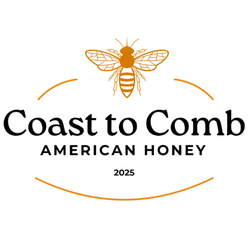Frequently asked questions
What is Raw Honey?
Raw honey is honey as it exists in the beehive or as it's extracted directly from the comb. Unlike conventional honey, raw honey is not subjected to extensive processing such as heating, pasteurization, or fine filtration. This minimal processing helps preserve the honey's natural enzymes, vitamins, minerals, and antioxidants.
When honey is heated above certain temperatures (typically 105-115°F), it can degrade the beneficial properties and alter the flavor. Fine filtration removes pollen, propolis, and beeswax particles, which are natural components of raw honey and contribute to its unique characteristics and potential health benefits.
Why Choose "Coast to Comb"?
At "Coast to Comb," we understand the value of authentic, high-quality raw US honey. We act as a centralized platform, bringing together small honey producers from across the United States. When you choose "Coast to Comb," you're not just buying honey; you're supporting a network of dedicated beekeepers and gaining access to a diverse selection of regional honey varieties, all in one convenient location. We streamline the process for both producers and consumers, ensuring that these exceptional, minimally processed honeys can reach a broader audience while maintaining their integrity and unique characteristics.
What about the assurance of Raw and Undiluted Product?
Small US producers often prioritize quality over quantity. They typically have a direct connection to their bees and hives, allowing for greater control over the honey extraction and bottling process. This close oversight minimizes the chances of the honey being heated, pasteurized, or diluted with syrups or other additives.
- Transparency: Many small producers are happy to share information about their beekeeping practices, the floral sources of their honey, and how they process their honey. This transparency builds trust and helps customers understand exactly what they are buying.
- Minimal Processing: Unlike large commercial operations that often process honey for consistent appearance and longer shelf life, small producers usually employ methods that preserve the natural state of the honey. This means the honey retains its natural enzymes, pollen, and beneficial compounds.
- Domestic Sourcing: Buying American not only supports your community but also reduces the supply chain, making it easier to trace the honey's origin and confirm its authenticity.
Do you support sustainable Beekeeping Practices?
Small US beekeepers often employ sustainable and bee-friendly practices. They are typically more focused on the health of their bee colonies and the local ecosystem. This can include:
- Responsible Hive Management: Practices that promote the well-being of the bees, such as proper disease management and minimizing stress on the colonies.
- Environmental Benefits: Bees play a crucial role in pollination, which is vital for agriculture and biodiversity. Supporting local beekeepers contributes to healthy bee populations and the overall environmental balance.
What makes honey taste different from one beekeeper to another?
Honey from small US producers often boasts a wider variety of unique and nuanced flavor profiles. This is because the flavor of honey is heavily influenced by the nectar source. Local producers often harvest honey from specific regions, resulting in distinct tastes based on the local flora.
How Can I Tell if Honey is Raw and Undiluted?
While it can be challenging to definitively confirm if honey is raw and undiluted without laboratory testing, there are several indicators to look for, especially when buying from small producers:
- Crystallization: Raw honey will almost always crystallize over time. If your honey remains perfectly liquid indefinitely, it might have been heated or adulterated. (gentle heating below the critical temperature of 105 will help crystals to break down)
- Cloudiness or Specks: Raw honey often appears cloudy due to the presence of pollen, propolis, and beeswax particles. You might also see small specks within the honey.
- Labeling: Look for labels that explicitly state "raw," "unfiltered," or "unpasteurized." However, be aware that labeling can sometimes be misleading, so combining this with other indicators is best.
- Source Information: Reputable small producers will usually provide information about their apiary, location, and beekeeping practices.
What is the return policy?
Our goal is for every customer to be totally satisfied with their purchase. If this isn’t the case, let us know and we’ll do our best to work with you to make it right.
When will I get my order?
We will work quickly to ship your order as soon as possible. Once your order has shipped, you will receive an email with further information. Delivery times vary depending on your location.
How much is shipping?
We will work quickly to ship your order as soon as possible. Once your order has shipped, you will receive an email with further information. Delivery times vary depending on your location.
